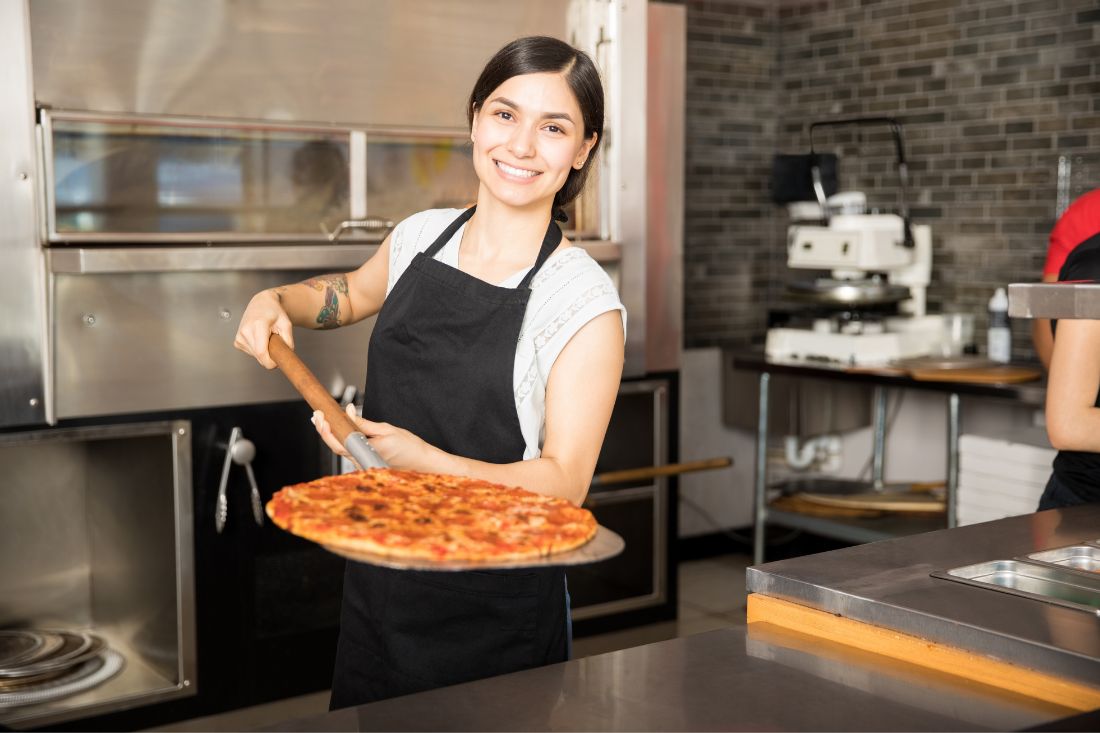
What you need to open a pizzeria: a complete guide
Opening a pizzeria is one of the most exciting and evolving entrepreneurial choices today. From traditional wood-fired establishments to modern take-out formats and franchise models, the industry continues to grow and reinvent itself.
In Italy alone, the number of pizzerias has increased by 25% in the last year. Demand shows no signs of waning, with around 8 million pizzas estimated to be sold every day. These figures explain why more and more people are looking at this market with interest.
At Bakeit, we support those who decide to take on this adventure by helping new entrepreneurs choose professional equipment for pizzerias, offering guidance and practical advice to start off on the right foot.
To answer the questions we’re asked most frequently, we’ve put together this article with all the essential information for those dreaming of opening their own pizzeria.
How much does it cost to open a pizzeria?
It’s hard to give an exact number, as the cost of opening a pizzeria depends on many factors: the type of establishment (take-out, by the slice, dine-in), the location, size, quality of the equipment, interior design, number of employees, and more.
What we can say is that, in order to have a realistic idea of the investment, it is necessary to start from a detailed business plan, evaluating all expenditure items and trying to foresee fixed and variable costs. Every project is unique, and this is precisely why it is important to rely on experienced suppliers who are able to guide you in choosing the most suitable solutions for your budget and format.
What permits are needed to open a pizzeria?
Opening a pizzeria involves a series of bureaucratic procedures, which may vary slightly from one municipality to another but generally follow a standard process. Here are the main permits and authorizations required:
- Business registration with the appropriate national or local authority.
- Tax identification number or VAT number, depending on your country’s tax system.
- Health and safety certifications, required for any business that prepares and serves food.
- Licenses for food service and beverage sales, often granted after completing a training course or demonstrating prior experience.
- Compliance with safety regulations for electrical, gas, and water systems, certified by authorized professionals.
- Permissions for signage or outdoor seating, if your pizzeria includes elements like tables on public sidewalks or visible signs.
Since requirements differ widely by region, it’s strongly recommended to consult a local accountant or a professional advisor who specializes in setting up food businesses. This will help you avoid delays, ensure full compliance, and streamline the process from the start.
What professional requirements are needed to open a pizzeria?
You don’t necessarily need to be a certified pizza chef to open a pizzeria, but most countries require at least one person involved in the business to have basic qualifications for handling and serving food.
These requirements may include:
- Completion of a food safety and hygiene course, often mandatory for anyone managing or preparing food.
- Previous experience in the food service industry, especially if you're applying for a license to serve meals or beverages.
- Proof of training or education in hospitality or culinary arts, depending on the type of establishment.
Before starting your business, make sure to check the regulations in your area or speak with a local consultant who can guide you through the process and ensure your team meets all legal requirements.
What equipment is needed to open a pizzeria?
An efficient pizzeria starts with a well-organized kitchen. Choosing the right equipment is essential for optimizing workflow, ensuring product quality, and maintaining safety standards. Needs vary depending on the format (by the slice, take-out, dine-in), but here are some key tools every professional pizzeria should have:
- Pizza dough mixer: the starting point. It allows for quick and even preparation of large amounts of dough, ensuring a consistent base every time.
- Dough ball rounder: simplifies the shaping of dough balls, ensuring uniformity and saving time in later stages.
- Proofing table: keeps the dough in optimal conditions during fermentation by maintaining constant temperature and humidity.
- Pizza stretcher: quickly rolls out dough balls into regular discs without overworking the dough or damaging its structure.
- Refrigerated counter with display: ideal for organizing ingredients and working efficiently during topping. It keeps everything fresh and speeds up service.
- Pizza oven: the heart of the pizzeria. Whether wood-fired, electric, or gas, it should be chosen based on your format, expected output, and local regulations. Professional ovens ensure even baking, high temperatures, and consistent results.
At our Bakeit store, you’ll find a complete selection of professional equipment for pizzerias, designed to meet the needs of all types of businesses: from small artisan shops to large chains.
Can you open a pizzeria without a flue?
Yes, you can open a pizzeria even without a flue, as long as you choose the most suitable technical solutions. In many premises (especially in historic buildings or apartment blocks) it’s not possible to install a flue. That’s why more and more entrepreneurs are opting for professional electric ovens, which don’t require smoke exhaust systems.
The latest generation of electric ovens, such as the Zanolli Citizen oven, are designed to deliver high performance, consistent temperatures, and optimized energy consumption. They ensure uniform, high-quality baking, offer more flexibility in space planning, and usually don’t require complex structural modifications.